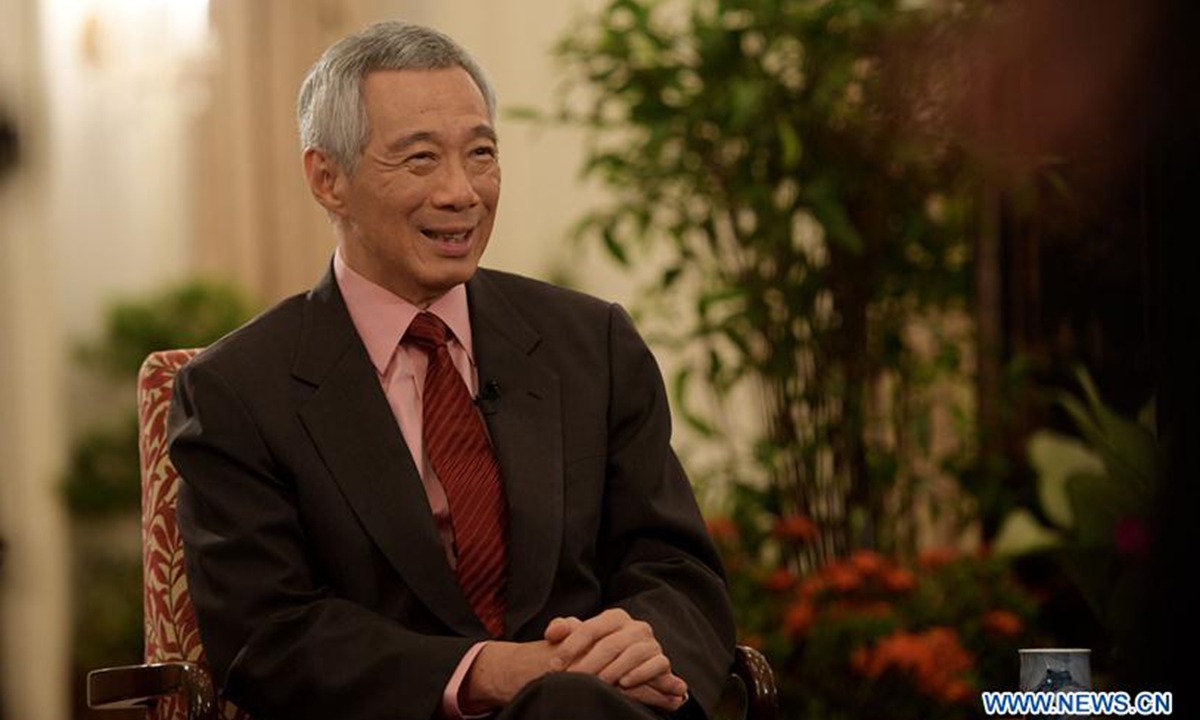Asian century only possible with regional and global engagement
By Ge Hongliang Source:Global Times Published: 2020/6/22 16:43:40

Singaporean Prime Minister Lee Hsien Loong receives an interview with Xinhua in Singapore in April 2019. Photo: Xinhua
Recently, some Singaporean politicians, including Prime Minister Lee Hsien Loong, Deputy Prime Minister and Finance Minister Heng Swee Keat, and Minister for Trade and Industry Chan Chun Sing, have publicly expressed their views about the state of current world affairs.
Among them is an article penned by Prime Minister Lee and published in Foreign Affairs magazine under the title of "The Endangered Asian Century: America, China, and the Perils of Confrontation." It's particularly eye-catching.
Against the backdrop of the raging coronavirus pandemic and intensifying confrontations between China and the US, Singapore and other Asian countries hope to keep their economics afloat and maintain a stable, secure and peaceful regional and international environment to promote the realization of an Asian century.
As Lee wrote in the article: "An Asian century is neither inevitable nor foreordained," when the world is undergoing profound changes unseen in a century. Asian countries need to deal with escalating China-US tensions as well as adapt to challenges in economics and politics in order to achieve an Asian century.
The term "Asian century" was proposed in the end of the 20th century after global academia and politicians evaluated the economic and social development of Asian countries as well as global economic advancement.
In the past two decades, China, Singapore and many other Asian countries have made remarkable achievements in economic and national development - making the Asian century a heated topic of debate.
To Singapore and some Southeast and East Asian countries, an Asian century means continuous prosperity and expansion of Asian economies under Pax Americana. In the process they can maintain close contacts with both China and the US in terms of economic development, enjoying both the peace overseen by the US and China's enormous markets.
China's understanding of the connotation of Asian century in terms of economics is the same as that of those countries. Yet when it comes to security, China in recent years has been more proactively advocating a new security concept. China seeks a new version of a common, comprehensive, cooperative and sustainable security.
Now, although China, Singapore and other regional countries have different understandings of the Asian century, they all face many uncertainties in economics and politics. In terms of politics, the rise of emerging powers such as China and Singapore has not led to the corresponding increase of their discourse power in international governance.
Besides, the strategic competition among major powers has become increasingly fierce. As for economics, while regional emerging powers maintain a high-speed growth, they have to face sluggish development trends, economic downward pressure and trade protectionism from Europe and America.
The US' understanding of the Asian century is very different from those of China, Singapore and other regional countries. The Washington views the Asian century as one that should be developed under US-dominated economic and investment structures. And of course, as the Trump administration promotes its "America First" policy, it does not care whether Asia is prosperous or not.
After all, the Asian century belongs to Asian countries as well as to the world. To realize an Asian century requires Asian countries to strengthen political dialogue, security cooperation, and enhance wider regional economic integration. It also requires the constructive participation of other countries outside the region. If the US can act in this way, it will provide certainties for the realization of an Asian century.
The author is deputy director with the College of ASEAN Studies at Guangxi University for Nationalities and a senior research fellow at the Charhar Institute. opinion@globaltimes.com.cn
RELATED ARTICLES:
Posted in: ASIAN REVIEW